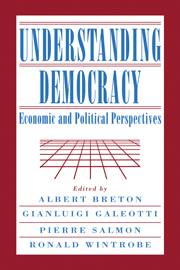Book contents
- Frontmatter
- Contents
- Contributors
- Introduction
- Part I Democracy, the market, and the law
- Part II Democracy and economic growth
- 5 Government spending and economic growth under democracy and dictatorship
- 6 Rent seeking and redistribution under democracy versus dictatorship
- 7 Democratic governments, economic growth, and income distribution
- Part III Democratic deficiencies and possible improvements
- Part IV Democratic expectations
- Index
6 - Rent seeking and redistribution under democracy versus dictatorship
Published online by Cambridge University Press: 05 December 2011
- Frontmatter
- Contents
- Contributors
- Introduction
- Part I Democracy, the market, and the law
- Part II Democracy and economic growth
- 5 Government spending and economic growth under democracy and dictatorship
- 6 Rent seeking and redistribution under democracy versus dictatorship
- 7 Democratic governments, economic growth, and income distribution
- Part III Democratic deficiencies and possible improvements
- Part IV Democratic expectations
- Index
Summary
Introduction
The idea that “too much” democracy is bad for economic development has resurfaced again in recent years. In the economic literature, the main reason advanced is that democracy is “plagued” by redistributional impulses. Perhaps the most famous work to advance this theme is Mancur Olson's (1982) The Rise and Decline of Nations, in which interest groups are reclassified as “distributional coalitions” that pursue their own selfish interests at the expense of overall economic efficiency. The older and more established the democracy, the larger the number of distributional coalitions that have a chance to form and the more the economic landscape is “rent” with inefficient laws, regulations, and other practices that hinder growth. In a similar vein, the vast literature on rent-seeking, originated by Tullock (1967), Krueger (1974), and Posner (1975), identified rent-seeking and its associated social costs with democratic government and thus made it possible, by a strange twist of logic in which democracy is identified with the proliferation of economic monopolies, for monopoly to be elevated to the status of a serious problem.
Although critical of democratic processes, none of the above-named authors has embraced the notion that authoritarianism can facilitate economic development, and indeed, Mancur Olson in particular has forcefully argued the opposite (Olson, 1993). However, the closely related idea that insulating economic policy from democratic processes–“a little bit” of dictatorship–can be good for economic development has gained currency, especially in political science and among theorists of development from both economics and political science who specifically point to the capacity of authoritarian states to resist distributional pressures as the key to successful development.
- Type
- Chapter
- Information
- Understanding DemocracyEconomic and Political Perspectives, pp. 125 - 143Publisher: Cambridge University PressPrint publication year: 1997



